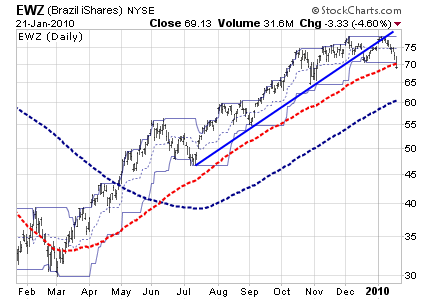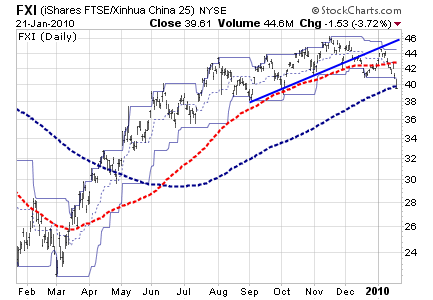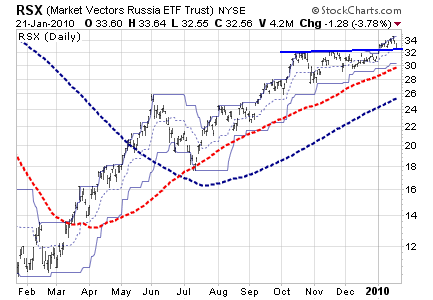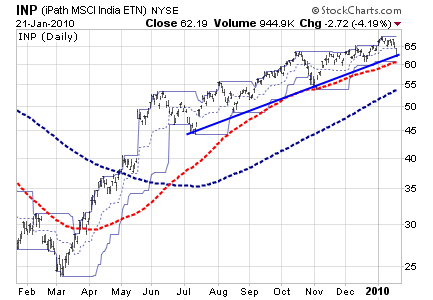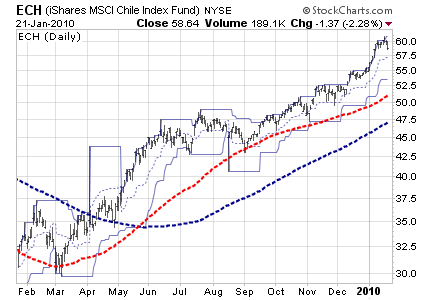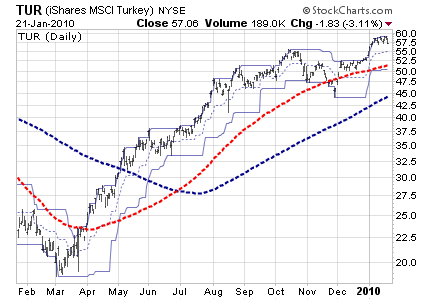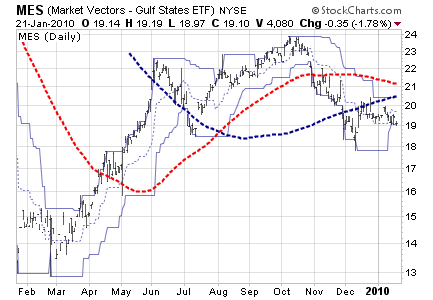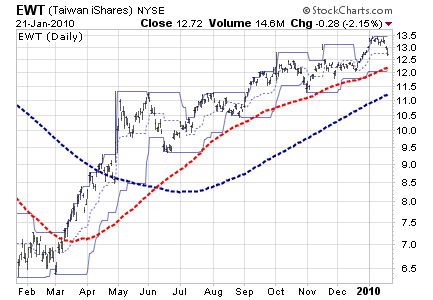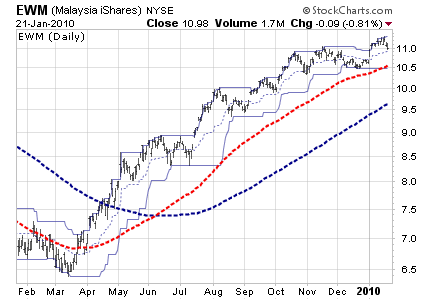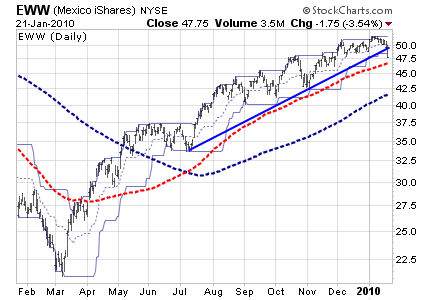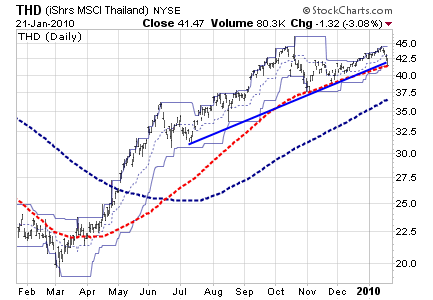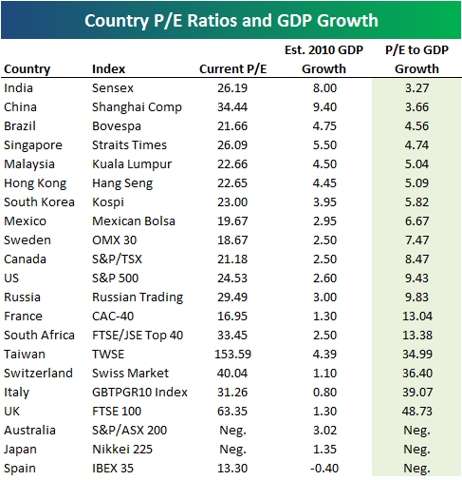 Despite the mostly good corporate earnings, with many beating analysts' estimates, couple with a surprising GDP perk up in 4Q2009, the markets had trouble turning around the bearish trend. Methinks it has a lot to do with the uncertainty with respect to the Volcker Rule. Although you will find pundits giving many other reasons for the current downtrend. The market got hints that Obama was mulling some banking reforms, and you could see the south ward bent from then onwards.The NYT had a good article on the Volcker Rule, my comments in colour:-------------New York Times / Dealbook: Obama is pushing hard for stricter financial regulation, promising in his first State of the Union address that he would not sign a bill that “does not meet the test of real reform.” This has left Wall Street wondering how much Mr. Obama’s regulatory proposal, known as the Volcker Rule, will cut into its profits.
Despite the mostly good corporate earnings, with many beating analysts' estimates, couple with a surprising GDP perk up in 4Q2009, the markets had trouble turning around the bearish trend. Methinks it has a lot to do with the uncertainty with respect to the Volcker Rule. Although you will find pundits giving many other reasons for the current downtrend. The market got hints that Obama was mulling some banking reforms, and you could see the south ward bent from then onwards.The NYT had a good article on the Volcker Rule, my comments in colour:-------------New York Times / Dealbook: Obama is pushing hard for stricter financial regulation, promising in his first State of the Union address that he would not sign a bill that “does not meet the test of real reform.” This has left Wall Street wondering how much Mr. Obama’s regulatory proposal, known as the Volcker Rule, will cut into its profits. The proposal, named for Paul Volcker, the former Federal Reserve chairman, would limit a bank’s ability to trade on its own account and would ban banks from investing in hedge funds and private equity funds. It could put an end to the huge Wall Street profit machines that emerged in the last decade since financial deregulation. Some analysts are already offering estimates about how costly the Volcker Rule could be. (Limiting banks' ability to trade on its own account IS GOOD, we are not going to see total prohibition, just a more sensible guide on exposure with respect to capital - now tell me that is not a good thing, but markets tend to discount absolute profits straight away... here we are talking about better quality and less volatile profits.)
In general, most analysts feel that Goldman Sachs has the most to lose if Congress passes some form of the Volcker Rule. David A. Viniar, Goldman’s chief financial officer, told analysts last week that the firm derives about 10 percent of its revenue from proprietary trading.

As such, Citigroup estimates that the Volcker Rule would cost Goldman $4.5 billion in revenue based on its 2010 estimates, translating to a $1 billion drop in profit. Analysts at JP Morgan Chase said the Volcker Rule would knock about $4.67 billion off Goldman’s future revenue stream, but they came to their projection a different way, estimating that the firm would experience a 20 percent decrease in its overall trading revenue.
Meanwhile, analysts believe that Morgan Stanley has less to lose than Goldman, as it shuttered most of its proprietary trading units after it was hit with huge losses in those divisions during the financial crisis. The firm has only two small proprietary desks left, one of which the bank is considering spinning off.
(Well, lessening the power of Goldman Sachs certainly cannot be a bad thing... seriously ... if they are allowed to do as they like and grow even bigger they can dominate the capital markets even more, in particular over the past 12 months where they showed their ability to bounce back a lot faster, but also because they read the markets well and largely avoided the subprime mess. In fact they made money from the mess. So, lessening the power that is Goldman Sachs is not a bad thing - if not, they can be a lot bigger too fast and we are back to the same thing of having something that is too big to fail.)
Factoring in losses from Morgan’s private equity and hedge funds business, Citigroup estimates the firm’s future revenue could decline 3 to 4 percent. Meanwhile, JPMorgan analysts estimate the firm could take a 15 percent hit to its overall trading revenue, about a $2 billion reduction in earnings.
JPMorgan, like Morgan Stanley, also got rid of most of its proprietary trading units after experiencing big losses, so it, too, is not expected to suffer as badly as Goldman on the trading front, but it will still take a hit from pulling out of its $7.3 billion in private equity investments.
Citigroup estimates that JPMorgan’s private equity business generates earnings of 15 cents a share for the bank. Meanwhile, analysts at Morgan Stanley estimate that JPMorgan would have a 3 to 5 percent hit to its earnings over time based on reduced trading and private equity investing.
Citigroup would likely take most of its hit from its proprietary trading units, as the firm is already in the process of getting rid of most of its hedge fund and private equity fund investments. Morgan Stanley estimates the bank’s overall revenue could be reduced 2 to 5 percent if it suffers a 5 to 15 percent decrease in trading revenue. Put in perspective, Morgan Stanley estimates that Citigroup could lose $134 million to $534 million from its bottom line in 2012, based on the bank’s making $3.5 billion after tax in trading that year.
Bank of America is expected to take minor hits from its private equity and proprietary trading businesses. Citigroup estimates that the bank has about $16.6 billion in private equity investments that it may have to get rid of, but that is small compared with its balance sheet. Citigroup estimates that Bank of America generates only 2 percent from that investment anyway, so the hit would be minor. Meanwhile, analysts at Morgan Stanley estimate that the bank’s bottom line would fall 3 to 5 percent through reduced trading activity and private equity investments.
(The reforms would include barring these banks from funding or seeding hedge funds. This incestuous relationship is one that is full of conflict of interests, and will usually result in "insider information trading fomenting", riding on coattails of mega trends, thus enlarging volatility.)
But all the analysts warned that their estimates were based on factoring out earnings from the banks’ wholly owned proprietary trading units and not taking into account trading the banks perform to facilitate client trades.
If the Volcker Rule is narrowly defined to count just trades done purely with the bank’s money, then the analysis would likely be correct. But if the Volcker Rule is broadly defined to encompass all trading that might put the firm’s balance sheet at risk, the banks could face higher costs.
That’s because 90 percent of the banks’ proprietary trading activity is linked to trades made on behalf of clients as the banks make markets to facilitate trades, Goldman recently said in a note to clients.

For example, Morgan Stanley and JPMorgan are large commodity traders, so they take on a lot of principal risk on behalf of clients because of the illiquid nature of that business. If the Volcker Rule is broadly defined to encompass that kind of proprietary trading, the two firms would have to stop performing that service, translating to a big loss to their bottom lines that would be far above analysts’ estimates.
If broadly defined, firms like Goldman and Morgan Stanley could simply give up their bank holding company status and operate without the government safety net — even though both have said they have no plans to do so. But for banks like JPMorgan, Bank of America and Citigroup, which have huge retail banking operations and cannot give up their banking charters, the Volcker Rule fallout could be very expensive in terms of lost profits.
Of course, the Volcker Rule may look very different once Congress gets its hands on it. It is not yet part of either of the financial regulatory packages in the House or Senate, and much will depend on committee hearings on the proposal in the weeks to come. The Senate is expected to take up the issue on Tuesday.
– Cyrus Sanati
------------------I believe the markets have tried their best to discount a worst case scenario for the Volcker Rule, hence downside will be limited from here. Seriously, the corporate earnings figures coming in have been pretty good and the 4Q09 figure tells us a lot of things are panning out better than expected. You may get the markets focusing on some other issue temporarily, but they will always go back to earnings and growth and jobs. Unless you are talking about a bubble or a financial crisis, the markets won't be down for long. The Volcker Rule is not a crisis or a bubble of any kind, its the right things to do to rein in excessive risk taking and bring about better quality earnings, and getting banks to do what they were SUPPOSED to do. Its good, but knee jerk wise, they have wiped almost 5% already and that is already too much no matter how you cut it.p/s photos: Macy Chan Mei Si























